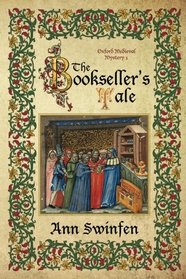First in a series. An enjoyable historical mystery, easy reading, nice sense of place. Good descriptions of medieval Oxford, the colleges, and lots of easily digested infomation on the bookseller's trade. The mystery itself is fairly light but still satisfying. I'll be looking for the second in the series.
What I enjoyed about this book was its setting and the fact that the narrator was a 14th century bookseller. As far as the mysteryâ¦. it was pretty easy to figure out, unlike what usually happens when I read mysteries. Most of the time I miss all the important clues or fail to understand them. But it never makes any difference since I read mysteries for the ambience and the characters rather than the plot. And that's exactly why I wanted to read this one.
Swinfen has done a nice job filling in details about life in the University town of Oxford in 1353 not long after the Plague had decimated the population. The book is narrated by Nicholas Elyot, a bookseller who had given up an Oxford fellowship in order to marry the daughter of a shopkeeper because in order to hold an academic position a man had to be a celibate. (I once found a short poem written in the middle ages that spelled it out this way: âA student at his books so placed that wealth he might have won. From book to wife did fly in haste, from wealth to woe did run. Now who hath played a feater cast since juggling first begun in knitting of himself so fast, himself he hath undone.)
For anyone who loves books, this novel is an interesting glimpse into what it was like when each book had to be laboriously written and illustrated by hand using carefully trimmed feather quills with costly inks on parchment made from animal skins and then bound in leather. As a result books were outrageously expensive and Oxford's students couldn't afford their own copies. Instead they went to bookshops like the one in this novel in order to rent peciae, specific sections of a manuscript that had been assigned for them to study.
It's interesting to think about how things have changed when you consider that these days you can read whatever you want without ever setting foot in a bookshop or even opening the pages of a book. Much as I enjoy the convenience I still prefer it the old way and even though I wouldn't have been able to afford owning an illuminated manuscript like those in Nicholas Elyot's shop, it would have been great just to have been able to do a little window shopping there.
Swinfen has done a nice job filling in details about life in the University town of Oxford in 1353 not long after the Plague had decimated the population. The book is narrated by Nicholas Elyot, a bookseller who had given up an Oxford fellowship in order to marry the daughter of a shopkeeper because in order to hold an academic position a man had to be a celibate. (I once found a short poem written in the middle ages that spelled it out this way: âA student at his books so placed that wealth he might have won. From book to wife did fly in haste, from wealth to woe did run. Now who hath played a feater cast since juggling first begun in knitting of himself so fast, himself he hath undone.)
For anyone who loves books, this novel is an interesting glimpse into what it was like when each book had to be laboriously written and illustrated by hand using carefully trimmed feather quills with costly inks on parchment made from animal skins and then bound in leather. As a result books were outrageously expensive and Oxford's students couldn't afford their own copies. Instead they went to bookshops like the one in this novel in order to rent peciae, specific sections of a manuscript that had been assigned for them to study.
It's interesting to think about how things have changed when you consider that these days you can read whatever you want without ever setting foot in a bookshop or even opening the pages of a book. Much as I enjoy the convenience I still prefer it the old way and even though I wouldn't have been able to afford owning an illuminated manuscript like those in Nicholas Elyot's shop, it would have been great just to have been able to do a little window shopping there.




